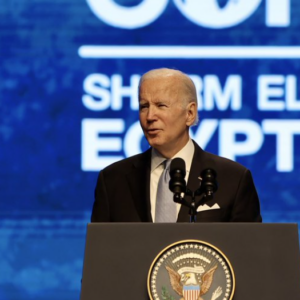What a great two weeks it’s been for President Joe Biden. First, his Democratic Party survived the midterm elections in the U.S., clinging to a bare majority in the Senate and winning close races for governor in key states. Those victories were vital if Biden is to stand firm against Donald Trump’s bid to recover the presidency in 2024.
Heartened by the Democrats’ stronger-than-expected showing in the midterms, Biden was off on a trip around the world, talking about climate change at Sharm El Sheikh on the tip of Egypt’s Sinai Peninsula. The next stop was Phnom Penh, where he advertised the wonders of the Indo-Pacific Economic Framework for Prosperity, a newly formed American creation, for the benefit of leaders of member states of the Association of Southeast Asian Nations (ASEAN).
Finally, he was off to the idyllic island of Bali for the G20, that is, the annual gathering of leaders of the world’s 20 most advanced and developing nations.
More important for Biden than the formal ASEAN and G20 meetings were the talks on the sidelines. In Phnom Penh, he sat down for a trilateral summit with South Korea’s President Yoon Suk-yeol and Japan’s Prime Minister Fumio Kishida. In Bali, the highlight for Biden was a conversation lasting three hours with China’s President Xi Jinping.
Now comes the hard part. Will Biden’s success in bringing together the leaders of those historic foes, Korea and Japan, really solidify their understandably difficult relationship in the interests of defense against a mutual enemy, North Korea, behind which lies the power of the North’s only real ally, China? Might Korea and Japan, together with the U.S., form a de facto alliance, that is, a bond that should be just as effective as a formal alliance?
Much though the Americans might like to see that level of cooperation between Washington’s two Northeast Asian allies, it’s not likely. Historical complexes, the wrongs of the Japanese colonial era, go too deeply into the Korean psyche for such a level of trust to develop. How can they draw much closer together when the Japanese won’t budge on well-known historical wrongs ranging from “comfort women” to unpaid slave labor? Dokdo, those two enormous rock formations in waters between Korea and Japan, are more than just disputed territory to which Korea clings passionately. They symbolize the accumulated wrongs of the ages.
The specter of China, though, has no doubt drawn Korea and Japan closer together. Suspicion, resentment, and bitterness about China are on the rise in South Korea while the Chinese keep the North on life support with fuel and food and fail to persuade Kim Jong-un to stop test-firing missiles and thinking of another nuclear test.
The Japanese, having occupied much of China in the days of the Japanese empire, look upon latter-day China under Xi as a potential enemy. The Chinese go on claiming the Senkaku Islands in the East China Sea with large fishing boats carrying mysterious electronic equipment. The Japanese cling tenaciously to the islands though no one lives on them.
The Japanese and Americans both are dedicated to making sure the Chinese never take over the island province of Taiwan. Korea would rather not quarrel with China over Taiwan but shares common cause with the U.S. and Japan on North Korea. For those reasons Biden’s summit with Xi, right after his meeting with Yoon and Kishida, was compelling. Taiwan was at the top of Biden and Xi’s agenda.
Biden accused China of “coercive and increasingly aggressive reactions” on Taiwan, and Xi countered that Taiwan was at “the core of China’s core interests … the foundation in the China-U.S. relationship.” Having dispensed with the rhetoric, however, neither Biden nor Xi hinted at going to war for the island.
Talking about Ukraine, Biden and Xi agreed “a nuclear war should never be fought,” a view that none would dispute, but Xi offered no such reassurance on North Korea. Afterward, Biden said frankly it was “difficult to determine” whether China wields such influence over the North. That’s hard to believe, though, considering North Korea’s utter dependence on China, the nation that rescued it from defeat early in the Korean War, for fuel and food too.
The best that can be said about these exercises in summitry was that Biden had the chance to chat with the leaders of Northeast Asia’s strongest countries. On a personal level, they got along fine, but polite words can only go so far. We can only hope their conversations usher in a period of stability in which they can go on talking through their problems and differences without feeling the need to go to war for them.

